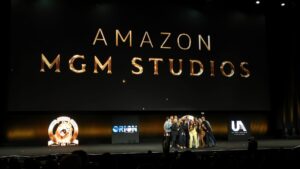The Revival of Theatrical Cinema: How Amazon is Changing the Game
At the recent CinemaCon 2025 in Las Vegas, the focus wasn’t merely on blockbuster franchises or dazzling special effects; it was about how technology, particularly in the form of Amazon, is reshaping the cinematic landscape. The gathering at Caesars Palace was electrified by an announcement from Amazon MGM Studios, which could mark a pivotal shift for Hollywood.
Amazon’s Bold Commitment
Amazon’s foray into the film industry is no longer just a side project. With a commitment to invest approximately $1 billion annually in theatrical releases, the retailer turned studio is set to produce between 12 and 15 original films each year. This ambition aligns perfectly with the aspirations of both exhibitors and audiences alike, eager for new content that goes beyond the cookie-cutter franchises.
The company’s recent announcement featured star-studded trailers from upcoming releases like Project Hail Mary, After the Hunt, and Verity. The attendance of actors like Ryan Gosling, Julia Roberts, and Chris Pratt added a buzz of excitement, exemplifying the quality and ambition driving Amazon’s transformation of the big screen.
One enthusiastic attendee, Brock Bagby, president at B&B Theatres, expressed his astonishment: “For their first year out, they pulled out all the stops.” Such praise indicates that Amazon’s strategy is resonating not only with audiences but also with industry stakeholders.
A Much-Needed Surge for Box Office Revenues
The U.S. box office has been languishing as a result of a significant decline in mid-budget films over the past decade. According to analysts, this shift could be costing the domestic cinema industry around $1 billion annually in ticket sales. This is a direct consequence of studios focusing predominantly on high-budget franchises while relegating lower-budget films — the bedrock of diverse storytelling — to streaming platforms.
Interestingly, Netflix and Amazon Prime Video have excelled in this niche, providing content that caters to a variety of genres and tastes. However, the cinematic experience offers something different—atmosphere, spectacle, and the communal act of watching a film.
The Effects of Studio Consolidation
The cinematic landscape has shifted, with major studio consolidations like the 20th Century Fox acquisition by Walt Disney resulting in fewer film releases. This trend directly impacts box office revenue, as a more limited slate translates to fewer opportunities for audiences to discover and enjoy new films.
In 2015, 20th Century Fox produced 17 films, but post-acquisition, that number dwindled to just a handful annually. Paul Dergarabedian, a senior media analyst at Comscore, noted, “With fewer releases, there is less potential for box office and concession sales.” It is clear that movie theaters thrive on variety, and the lack of films has left both audiences and exhibitors yearning for more.
A Beacon of Hope: Filling the Void Left by Major Studios
Amazon’s commitment to revitalizing theatrical releases, along with the emergence of smaller studios like A24, offers a compelling solution to the current cinema crisis. Commentators believe that this surge in diverse offerings is crucial for returning audiences to theaters.
As Michael O’Leary, CEO of Cinema United, points out, there is a direct correlation between film releases and box office strength: “The number of movies being released continues to trend in the right direction.” With projections showing at least 110 wide releases expected in 2025, the industry is slowly but surely emerging from the shadow of the pandemic.
Conclusion: Why This Matters
As cinema enthusiasts at Extreme Investor Network, we recognize that Amazon’s ventures represent more than just financial opportunity; they signal a renewed focus on storytelling across various genres. This transformation could help close the gap left by the exit of mid-budget films from theaters, enabling new voices and fresh narratives to flourish on the big screen once again.
In this quickly evolving landscape, staying informed and engaged is essential. At Extreme Investor Network, we are committed to keeping our readers updated on these trends to help navigate the future of investing in entertainment. Investing in the arts is not just a financial endeavor; it is a chance to be part of a cultural renaissance.
Join us as we chart the exciting waters of cinema’s future—where innovation, creativity, and heartfelt storytelling are set to collide!

